Representing UMCES at the 12th International Conference on the Environmental Management of the Enclosed Coastal Seas
Vanessa Vargas-Nguyen ·Last November 5-8, 2018, I was fortunate to have attended and presented at the 12th International Conference on the Environmental Management of the Enclosed Coastal Seas (EMECS 12) held at the Jomtien Palm Beach Resort in Thailand. EMECS 12 was hosted by the International EMECS Center and co-hosted by the Royal Society of Thailand, several leading Thai Universities, and the UNESCO-IOC/WESTPAC. Jane Nishida and Bob Summers--both former Maryland Secretaries of the Environment--Bill Dennison, Dave Nemazie, and I made up the only contingent from the United States present at the event.
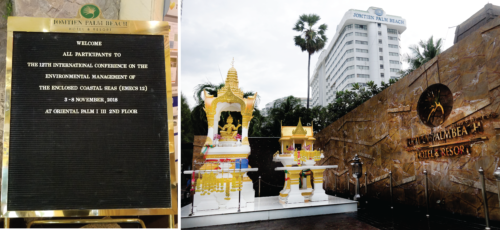

The International EMECS Center is a nonprofit organization established for promoting international exchanges to solve the problem on the environmental conservation of enclosed coastal seas in the world, including the Seto Inland Sea (Japan), the Chesapeake Bay (USA), the Baltic Sea (Northern Europe), and the Mediterranean Sea (Southern Europe). The theme of EMECS 12 was “Cooperative stewardship for integrated management toward resilient coastal seas”. Much of the presentations and posters centered on restoration and conservation of coastal and marine ecosystems, integrated coastal management and stewardship, and sustainable use and development of coastal resources, drawing mostly upon Asian water bodies such as the Gulf of Thailand and the Seto Inland Sea of Japan as case studies.
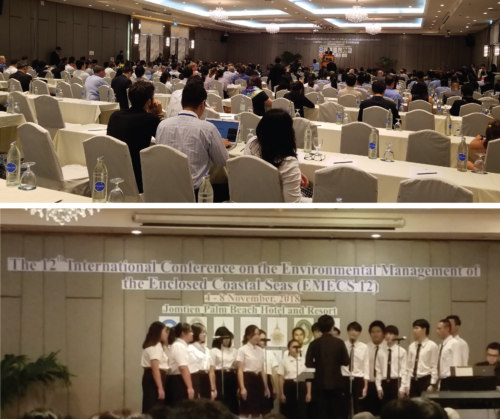
The opening ceremony of the conference featured a special rendition of "What a Wonderful World" by a Thai high school choir, effectively setting the mood for the next three days. There were three keynote addresses from distinguished scientists from Japan, Thailand, and Vietnam. Dr. Masataka Watanabe of Japan talked about strategies for achieving the sustainable development goals for Yangtze River estuary and Shanghai City despite multiple stressors. Dr. Sanit Aksornkoae of Thailand talked about sustainable management of the mangrove ecosystem and its importance in maintaining coastal and marine resources in Thailand. Dr. Vo Si Tuan talked about how the IOC-WESTPAC is advancing monitoring, restoration and conservation of coastal ecosystems in the Western Pacific and adjacent regions.
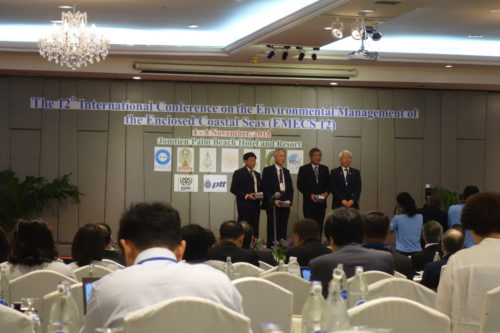
A major theme in the conference was that managing our coastal seas is a “wicked problem” that requires a holistic approach based on the involvement of multiple stakeholders with diverse perspectives. Transdisciplinarity was one of the concepts explored, specifically in small-scale fisheries governance in Thailand. One of the major conclusions was that the critical first step in solving wicked problems is to bring key stakeholders together to discuss the problems in a well-facilitated manner in order to share knowledge and experiences, exchange ideas in respectful ways, and to work collaboratively in coming up with solutions that are acceptable--and thus feasible--to implement.
Another concept related to integrated management that was talked about a lot in the conference was that of satoumi, originally conceptualized in Japan. Satoumi is defined as "marine and coastal landscapes that have been formed and maintained by prolonged interaction between humans and ecosystems." In the context of the conference, satoumi initiatives are a form of integrated coastal management, defined as a community-based active conservation involving people’s participation. In many deteriorated enclosed coastal seas in Japan and other parts of Asia, satoumi is now being recognized as vital in order to achieve resilient coastal seas and to be able to reconstruct a better relationship between human and the seas. This is done by recognizing the interlinkages between environmental changes and ecosystem services.
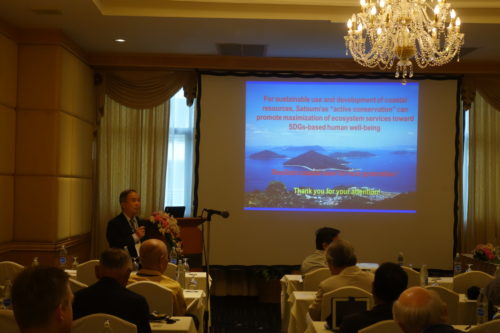
Bill, Dave, and I each presented on different ecosystem health report cards in various stages. Dave was an invited speaker for the session "Estuaries of the world: issues and perspectives". He introduced the IAN report card process and talked about the development of the Guanabara Bay report card through partnership and public engagement as well as the benefits, challenges, and lessons learned through the process. I was in the same session as Dave, and my presentation was on the different ecosystem health report cards in the Chesapeake Bay and its tributaries. My focus was mostly on its management impacts, limitations, stakeholder perspectives, and future directions. Bill was in a separate session and his presentation was on the Tuul River report card, focusing mostly on the conceptualization stage and stakeholder engagement process.
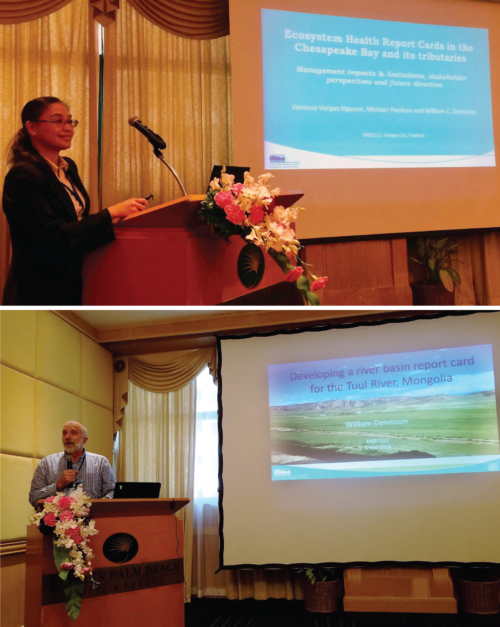
Another major theme was the issue of plastics and microplastics, with the last plenary session of the conference dedicated to this topic. This is a major concern in the Southeast Asian region since a recent report showed that the top source of the plastic pollution in the world’s oceans include China, Indonesia, Vietnam, Philippines, Malaysia, and Thailand. During the closing ceremony of the conference, Dave read the EMECS 12 Conference Declaration emphasizing that the international community of scientists must work even more closely with all stakeholders, and that new social and educational networks focused on collaboration between stakeholders on local to global scales must be formed. The highschool student participants of the conference also developed and read their own declaration, stating their desire to be part of the solution.
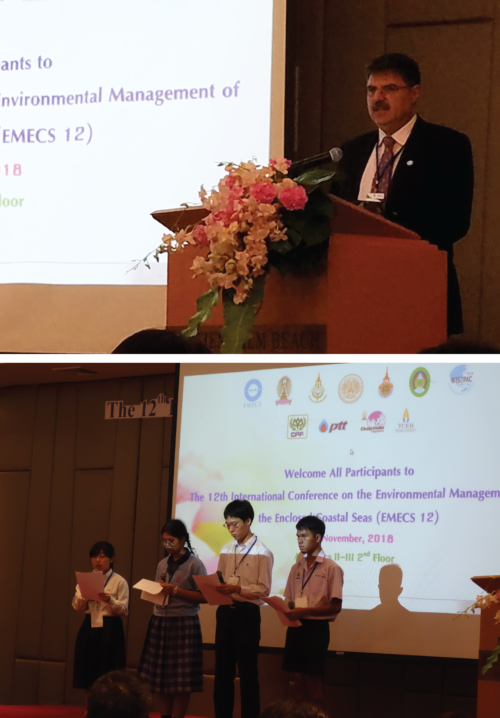
All in all, I greatly enjoyed my EMECS experience. This blog is mostly focused on the conference itself, but two more blogs related to this event are forthcoming. It's also the first time in ten years since I've last attended a scientific conference in Asia, and it's comforting to know that integrated and holistic management is also being advanced in the region.
About the author
Vanessa Vargas-Nguyen

Dr. Vanessa Vargas-Nguyen is a Science Integrator with the Integration and Application Network and an associate faculty of the Marine Estuarine and Environmental Science Graduate Program. Her current interest is in transdisciplinary approaches, socio-environmental assessments, socio-environmental justice, stakeholder engagement, and adaptive environmental governance. Vanessa is originally from the Philippines and has extensive experience in molecular biology and marine science, specializing in microbial communities and molecular processes associated with Harmful Algal Blooms and shrimp, corals, and human diseases. She has since shifted her focus on how science can benefit society and was conferred with the first Ph.D. under the new Environment and Society foundation of the MEES graduate program. Her dissertation used ethnographic approaches to investigate the role of socio-environmental report cards in transdisciplinary collaboration and adaptive governance for a sustainable future. She received academic training from the University of the Philippines (BSc; MSc) and the University of Maryland (MSc; PhD). She is involved in developing holistic socio-environmental assessments for complex systems such as the Mississippi River and Chesapeake Bay watersheds and is coordinating a multi-year international transdisciplinary research consortium involving the US, Norway, Philippines, Japan, and India.

